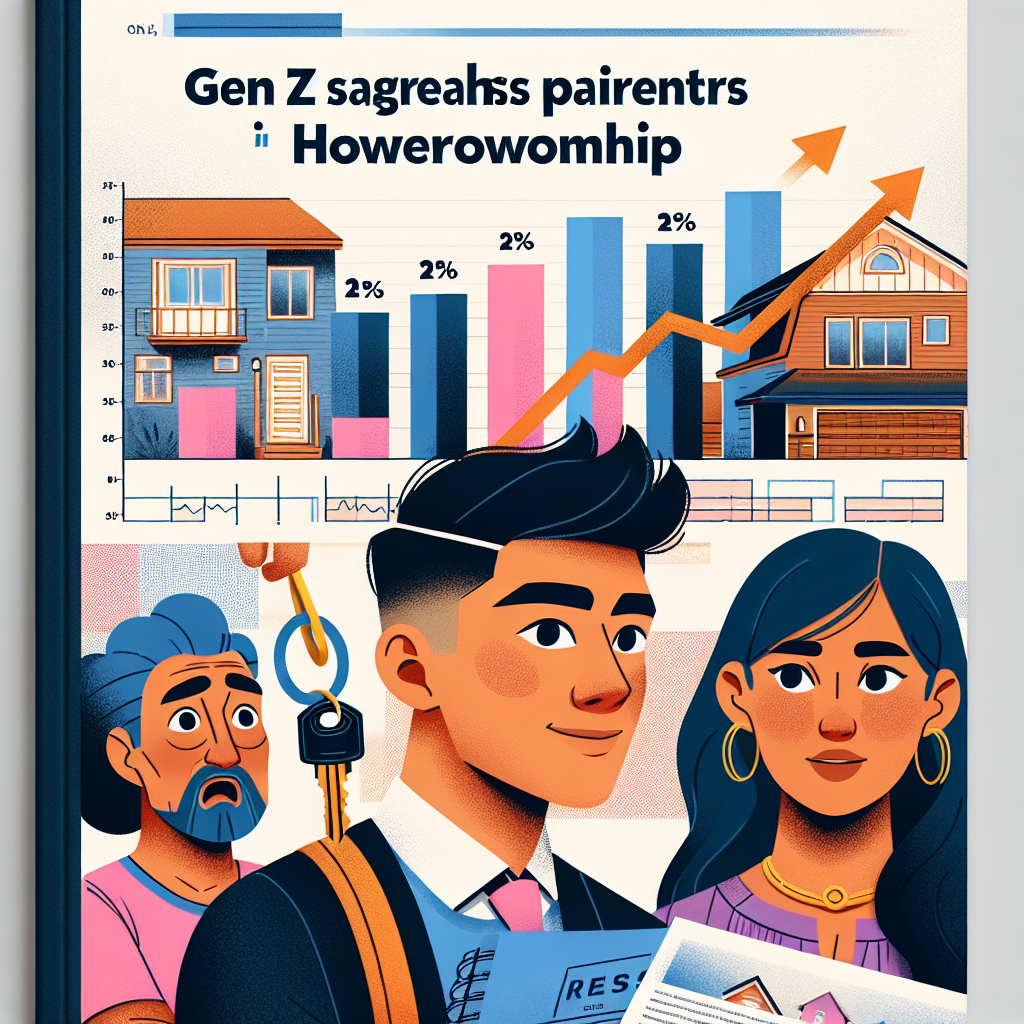-
Table of Contents
- Gen Z Surpasses Parents in Homeownership, New Report Reveals
- Understanding Gen Z: Who Are They?
- The Rise of Gen Z Homeownership
- Factors Driving Gen Z Homeownership
- 1. Financial Savviness
- 2. Technological Advantage
- 3. Remote Work Opportunities
- 4. Support from Parents
- Case Studies: Gen Z Homeowners
- Case Study 1: Sarah’s Journey to Homeownership
- Case Study 2: Mark’s Investment Strategy
- Challenges Faced by Gen Z Homeowners
- Expert Opinions on Gen Z Homeownership
- The Future of Gen Z Homeownership
- Conclusion
Gen Z Surpasses Parents in Homeownership, New Report Reveals

In a surprising turn of events, Generation Z (Gen Z) is outpacing their parents in homeownership rates, according to a new report. This trend defies the common narrative that younger generations are struggling to achieve the same financial milestones as their predecessors. This article delves into the factors contributing to this shift, supported by statistics, case studies, and expert opinions.
Understanding Gen Z: Who Are They?
Gen Z, also known as Zoomers, refers to individuals born between the mid-1990s and early 2010s. This generation is characterized by their digital nativity, social consciousness, and unique financial habits. Unlike Millennials, who faced significant economic challenges during the 2008 financial crisis, Gen Z has grown up in a more stable economic environment, albeit with its own set of challenges.
The Rise of Gen Z Homeownership
Recent data from the National Association of Realtors (NAR) indicates that Gen Z is entering the housing market at a faster rate than their parents did at the same age. According to the report:
- Approximately 30% of Gen Z adults (ages 18-24) own homes, compared to 28% of Millennials at the same age.
- Gen Z homeownership rates have increased by 5% over the past two years.
- In certain metropolitan areas, Gen Z homeownership rates are even higher, reaching up to 35%.
Factors Driving Gen Z Homeownership
1. Financial Savviness
Gen Z is known for their financial prudence. Growing up during the aftermath of the 2008 financial crisis, they have witnessed the consequences of poor financial decisions. As a result, they are more likely to save diligently and invest wisely. A survey by Bank of America found that:
- 54% of Gen Z respondents have a savings account.
- 26% are already investing in stocks or mutual funds.
- 70% prioritize saving for a home over other financial goals.
2. Technological Advantage
Gen Z’s digital proficiency gives them an edge in navigating the real estate market. Online platforms and apps have made it easier for them to research properties, compare prices, and secure mortgages. Real estate apps like Zillow and Redfin have seen a significant increase in Gen Z users, who appreciate the convenience and transparency these platforms offer.
3. Remote Work Opportunities
The COVID-19 pandemic has accelerated the shift towards remote work, allowing many Gen Z individuals to live in more affordable areas while maintaining their jobs. This flexibility has enabled them to purchase homes in suburban or rural areas where property prices are lower. According to a report by Zillow:
- Remote work has increased homeownership rates among Gen Z by 8%.
- Gen Z buyers are more likely to purchase homes in smaller cities and towns.
4. Support from Parents
Many Gen Z individuals receive financial support from their parents, who are eager to help them achieve homeownership. This assistance often comes in the form of down payment gifts or co-signing on mortgages. A study by the Urban Institute found that:
- 35% of Gen Z homebuyers received financial help from their parents.
- 20% had parents co-sign their mortgage loans.
Case Studies: Gen Z Homeowners
Case Study 1: Sarah’s Journey to Homeownership
Sarah, a 23-year-old software engineer from Austin, Texas, purchased her first home in 2022. She attributes her success to a combination of diligent saving, remote work, and parental support. “I started saving for a home as soon as I got my first job,” she says. “Working remotely allowed me to move to a more affordable area, and my parents helped with the down payment.”
Case Study 2: Mark’s Investment Strategy
Mark, a 25-year-old marketing professional from Denver, Colorado, took a different approach. He invested in stocks and cryptocurrency during his college years, which provided him with the capital needed for a down payment. “I saw an opportunity to grow my savings through investments,” he explains. “When the time was right, I used those gains to buy a home.”
Challenges Faced by Gen Z Homeowners
Despite their success, Gen Z homeowners face several challenges:
- High Property Prices: In many urban areas, property prices remain prohibitively high, making it difficult for Gen Z to enter the market.
- Student Loan Debt: Many Gen Z individuals carry significant student loan debt, which can impact their ability to secure a mortgage.
- Economic Uncertainty: The ongoing economic uncertainty due to the COVID-19 pandemic and other global factors can affect job stability and financial security.
Expert Opinions on Gen Z Homeownership
Experts have weighed in on the trend of rising Gen Z homeownership. Lawrence Yun, Chief Economist at the National Association of Realtors, notes, “Gen Z’s approach to homeownership is pragmatic and financially sound. They are leveraging technology and remote work opportunities to achieve their goals.”
Similarly, financial advisor Suze Orman emphasizes the importance of financial education. “Gen Z is more financially literate than previous generations. They understand the value of saving and investing, which is crucial for homeownership.”
The Future of Gen Z Homeownership
The trend of rising Gen Z homeownership is likely to continue, driven by their financial savviness, technological advantage, and remote work opportunities. However, addressing the challenges they face will be crucial for sustaining this momentum. Policymakers and financial institutions can play a role by:
- Providing Affordable Housing Options: Increasing the supply of affordable housing can help more Gen Z individuals enter the market.
- Offering Financial Education: Programs that teach financial literacy can empower Gen Z to make informed decisions about homeownership.
- Addressing Student Loan Debt: Policies aimed at reducing student loan debt can improve Gen Z’s financial stability and ability to purchase homes.
Conclusion
In conclusion, Gen Z is defying expectations by surpassing their parents in homeownership rates. Their financial prudence, technological proficiency, and ability to adapt to remote work have positioned them well in the housing market. While challenges remain, the future looks promising for Gen Z homeowners. By addressing these challenges and supporting their efforts, we can ensure that this trend continues, benefiting not only Gen Z but the broader economy as well.
As we look ahead, it is clear that Gen Z’s approach to homeownership offers valuable lessons for future generations. Their success serves as a testament to the power of financial literacy, adaptability, and the importance of leveraging technology in achieving financial goals.








